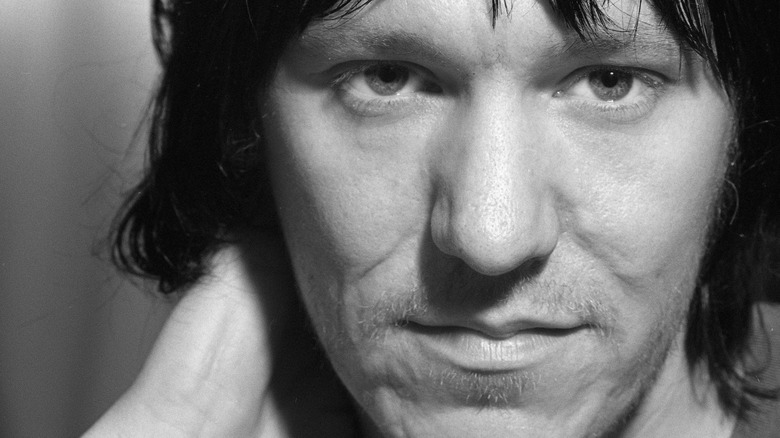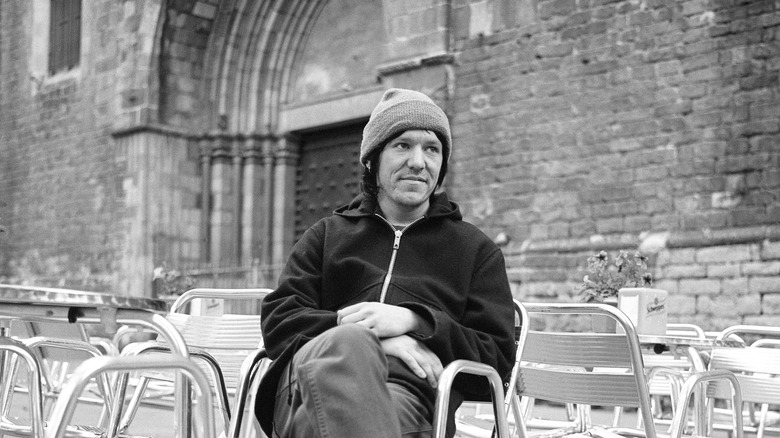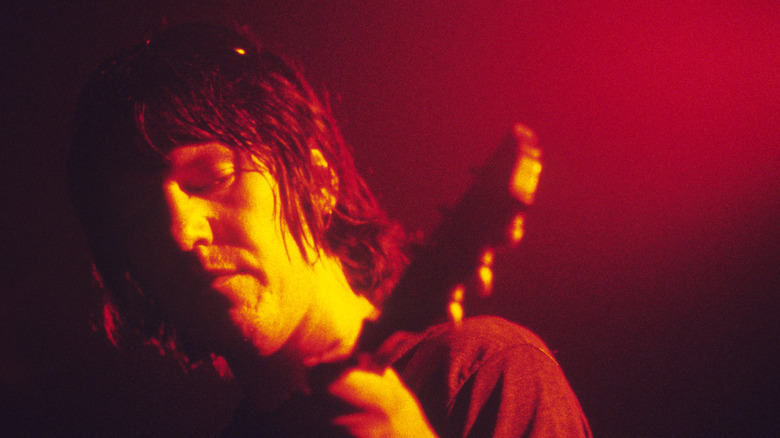Tragic Details Found In Elliott Smith's Autopsy Report
The music world was saddened but not exactly shocked when news broke that indie rock singer-songwriter, Elliott Smith, took his own life on October 23, 2003. According to The Guardian, Smith built his career around highly confessional songs dealing with addiction, depression, and even suicide — all subject matter drawn from his real-life experiences. Things nevertheless seemed to be going well for the musician when he died; his song "Miss Misery" from the "Good Will Hunting" soundtrack had been nominated for an Academy Award, and Smith had even performed at the Oscars Ceremony in 1998 (per IMDb). By most other measures, Smith's star seemed to be on the rise.
What goes without saying, though, is that despite all outward appearances, problems with depression and substance abuse can be persistent, long-lasting, and frequently concealed. Here are the tragic details found in Elliot Smith's autopsy report, and what they tell us about how the musician died.
If you or anyone you know is having suicidal thoughts, please call the National Suicide Prevention Lifeline at 1-800-273-TALK (8255).
If you or anyone you know is struggling with addiction issues, help is available. Visit the Substance Abuse and Mental Health Services Administration website or contact SAMHSA's National Helpline at 1-800-662-HELP (4357).
The toxicology report
With a well-documented history of substance use disorder, Elliot Smith's medical examiners turned to Smith's toxicology report for clues about what his frame of mind was like prior to his suicide. According to Rock NYC, and based on evidence from the 2009 documentary about the life and death of the musician called "Searching for Elliott Smith" by director Gil Reyes (per IMDb), Smith is thought by some to have quit several psychiatric medications "cold turkey" just before he died.
According to Healthline, suddenly stopping psychiatric medication, including antidepressants, can lead to an uptick in anxiety, serious depression, and even suicide. Could Smith's decision to discontinue his psychiatric medication have played a part in his death? Or could he have perhaps relapsed into substance abuse before he died?
Those theories are not, unfortunately, backed up by the singer's toxicology report: There were no illegal substances in his system, including drugs and alcohol. What's more, the only other medications listed are normal amounts of prescription medication taken to treat depression and for adult ADHD, meaning he was still taking his prescriptions up until the time he died (per Rock NYC). At one point, Smith may have stopped taking his prescription psychiatric medication too quickly, or even relapsed into drug and alcohol abuse. What details from his autopsy report tell us, however, is this was certainly not the case when he died, and was not likely a factor influencing his suicide.
The cause of death
As is often the case when a high-profile celebrity dies, unsubstantiated conspiracy theories related to Elliott Smith's then-girlfriend Jennifer Chiba, who was in the couple's bathroom after an argument when Smith fatally injured himself, quickly took off all throughout the internet, and although they're widely debunked, persist in the minds of many to this day. Worsening this speculation was the truly tragic cause of death for the musician listed in his autopsy report, which is also a highly uncommon method by which someone would choose to take their own life.
The official cause of death listed on the autopsy report was two stab wounds to the chest, per Autopsy Files; one pierced his heart. Perhaps because it's difficult for some to conceive that anyone, no matter their state of mind, could fatally injure themselves in this fashion, some speculate that Chiba may have actually murdered Elliott Smith. There is no evidence that is the case, however, and Chiba has denied wrongdoing, per MTV.
As previously stated, self-inflicted stab wounds are certainly an uncommon way to die by suicide. When it does happen, though, it is most often attempted by young men, and individuals with a history of psychiatric disorders, per Karger, as was the case with Smith. This may help explain the shocking and tragic means by which Smith chose to take his life.
What remains inconclusive
The final tragic detail revealed in Elliott Smith's autopsy only deepens the mystery in the court of public opinion related to Jennifer Chiba. It was ultimately ruled inconclusive whether or not the stab wounds from which Smith died were the result of foul play or from suicide. Since Chiba was Elliot's live-in girlfriend and was home with the troubled singer when the stabbing happened, many believe she would be the prime suspect if, in fact, the singer had been murdered. Per MTV, however, Chiba was never charged with a crime, and reports that she refused to cooperate with the police following her boyfriend's death are inaccurate.
Frustratingly, Elliott Smith's autopsy report offers some answers but leaves many other questions unresolved. What is known is that the anguished singer-songwriter had not relapsed with drugs and alcohol when he died, nor is there evidence that he had discontinued the use of his psychiatric medication, as some claim. He did in fact die from stab wounds, which is an uncommon but not unheard of method of suicide.
Unfortunately, though, the coroner could not conclusively call those stab wounds self-inflicted. For these reasons, speculation about exactly what happened to Smith on that day will likely persist, at least as long as people are listening to his heartfelt and beautiful music.



